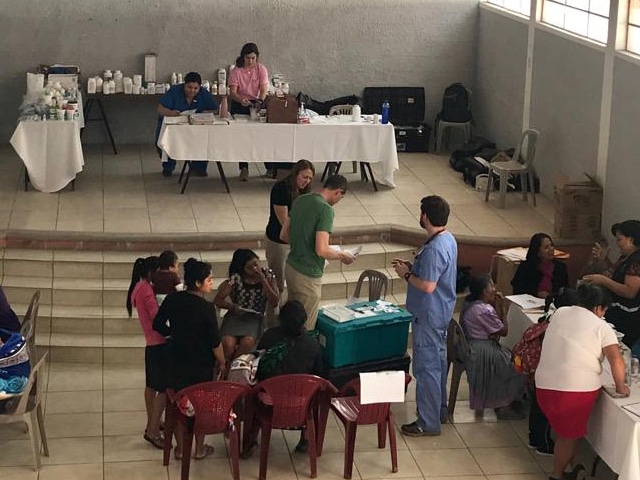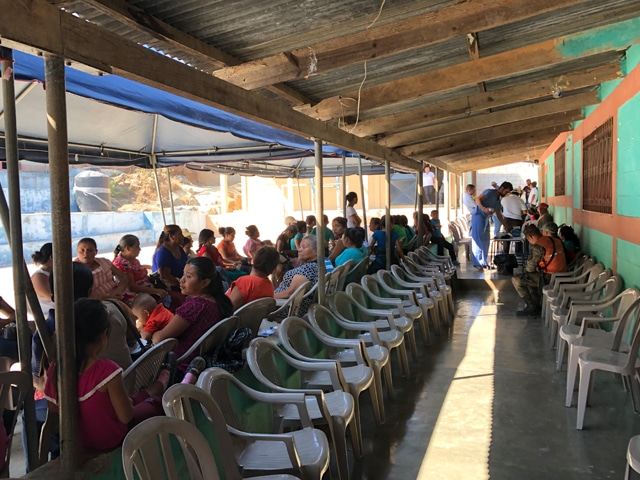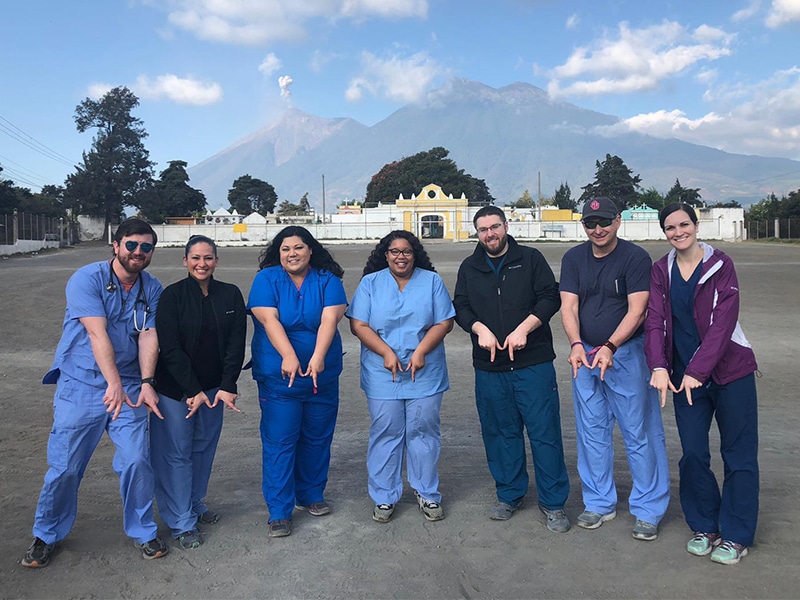“M” stands for Methodist for Christopher Farmakis, MD, and the team during a recent mission trip to Guatemala.
“Not only does a medical mission allow you to help others, but it also helps you become a well-rounded physician as well as a more well-rounded human,” says Dr. Farmakis, a third-year resident with the Methodist Dallas Medical Center Internal Medicine Residency Program. “You’re expanding your comfort zone and putting into practice all the investment you’ve made in your medical education for an amazing cause.
“Now when I encounter patients from that part of the world, I’m a little better prepared to see what they’re coming from.”–Dr. Farmakis
“You go to places and see diseases you hardly ever encounter stateside. You meet physicians and nurses who know how to handle these complex conditions. They’re seeing them daily, diagnosing and dealing with them with less than half the resources we have here. It blows my mind every time I think about it,” Dr. Farmakis says.
A dream to serve overseas
Long before Dr. Farmakis spent two weeks from sunup to way past dusk helping care for 2,000 patients he’d probably never see again, he was thinking about this trip.
Long before he helped gather, sort, and package the hundreds of pounds of medications the team would be taking, he was thinking about this trip.
Long before he even began training at Methodist Dallas, he was thinking about this trip.
“By the grace of God, my medical school [Wright State University Boonshoft School of Medicine in Ohio] was a big arena for global health research,” Dr. Farmakis says. “I’m a Christian, and I believe in Jesus and want to follow him in his plan for me. I believe part of that is trying to incorporate these trips into my medical career.”
During med school, mission trips to Ecuador and Bangladesh further spurred his interest. While researching programs that would offer him the chance to pursue global healthcare, he found Methodist Dallas.
 A makeshift medical clinic in the community center of a rural Guatemalan village.
A makeshift medical clinic in the community center of a rural Guatemalan village.
Working with what you’ve got
Dr. Farmakis’ wife is Ecuadorian. He speaks Spanish and feels a connection to Central America, so the Guatemala mission trip was a perfect fit. This marks the 16th year that Thomas Shima, DO, faculty with the Methodist Charlton Medical Center Family Medicine Residency Program, has led an international medical mission trip.
“He really has a heart for these missions,” Dr. Farmakis says. “It’s awesome to be around him.”
Each week in Guatemala had a different home base: Antigua, an ancient colonial town, and Zacapa, “which is more desolate,” Dr. Farmakis says. At dawn, the team headed out for small towns, where clinics were set up in schools, gymnasiums, and city buildings.
Each space was separated into a waiting room, an exam room, and an area reserved for OB-GYN cases. Long tables were covered with carefully organized medications: antibiotics, oral diabetes medicine, antifungals, pain relievers, and vitamins.
“We’re going with our basic instruments and our hands,” Dr. Farmakis says. “We don’t have the luxury of X-rays or CT scans.”
 Dozens of patients line up to be seen at a medical clinic in a rural Guatemalan village.
Dozens of patients line up to be seen at a medical clinic in a rural Guatemalan village.
Letting go and holding on
The lack of such equipment that’s all but taken for granted in the United States was apparent on multiple occasions. When a mother brought in her 2-year-old, who had a high fever and rapid heart rate, the team immediately put an IV in him. “We held the bag up in the air and infused the fluid,” Dr. Farmakis recalls.
“We had some broad-spectrum intramuscular antibiotics, and we were able to stabilize him and call for an ambulance that took him to the hospital.”
He pauses.
“The one unfortunate thing is that once they go to the hospital, we’re never sure what the next steps were. There are a lot of emotions to deal with, especially for cases we don’t see here much.”
But he wouldn’t trade those long, hot, crazy-busy days for anything. And he certainly wouldn’t trade what he brings home — a greater compassion, especially for his international patients.
“Now when I encounter patients from that part of the world, I’m a little better prepared to see what they’re coming from,” Dr. Farmakis says.
While he is proud to have been a part of the 2019 Guatemala trip, he humbly gives the credit to those who make it possible.
“I want to make clear that my role in this whole thing is extremely, extremely small,” he says. “People came before me and keep going every year and have made the medical connections. Because of them, this is still happening.”
The doctors of tomorrow could use your support today. Donations to Methodist Health System Foundation benefit the Graduate Medical Education program at Methodist Health System.
Methodist Health System’s mission is to improve and save lives through compassionate, quality healthcare. Our Mission to Medicine series shares the inspirational stories of clinicians extending this mission beyond hospital walls to local, national, and international communities.

